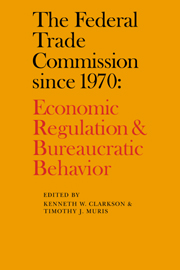Book contents
- Frontmatter
- Contents
- List of contributors
- Preface
- 1 Introduction
- Part I The institutional setting
- Part II Nature and consequence of FTC actions
- Introduction
- 6 Bureau of Competition: antitrust enforcement activities
- 7 Information for antitrust and business activity: line-of-business reporting
- 8 Industry structure investigations: Xerox's multiple patents and competition
- 9 Exclusionary practices: shopping center restrictive covenants
- 10 Legislative powers: FTC rule making
- 11 Rewriting consumer contracts: creditors' remedies
- 12 Regulating postpurchase relations: mobile homes
- 13 Regulating information: advertising overview
- 14 Special statutes: the structure and operation of the Magnuson-Moss Warranty Act
- Part III Conclusions and reforms
- Notes
- Selected bibliography
- Index
6 - Bureau of Competition: antitrust enforcement activities
Published online by Cambridge University Press: 05 November 2011
- Frontmatter
- Contents
- List of contributors
- Preface
- 1 Introduction
- Part I The institutional setting
- Part II Nature and consequence of FTC actions
- Introduction
- 6 Bureau of Competition: antitrust enforcement activities
- 7 Information for antitrust and business activity: line-of-business reporting
- 8 Industry structure investigations: Xerox's multiple patents and competition
- 9 Exclusionary practices: shopping center restrictive covenants
- 10 Legislative powers: FTC rule making
- 11 Rewriting consumer contracts: creditors' remedies
- 12 Regulating postpurchase relations: mobile homes
- 13 Regulating information: advertising overview
- 14 Special statutes: the structure and operation of the Magnuson-Moss Warranty Act
- Part III Conclusions and reforms
- Notes
- Selected bibliography
- Index
Summary
Almost a decade has passed since Miles Kirkpatrick became chairman of the Federal Trade Commission and set about to rejuvenate its antitrust enforcement program. That is time enough to provide a basis on which to evaluate that effort. It is appropriate to ask whether the Commission's performance has significantly improved, as much public comment and its vastly increased budget would seem to suggest.
To answer that question I examine the antitrust decisions and settlements made and complaints issued by the Commission from January 1, 1970, to December 31, 1977 (hereafter “the period”). I have classified them as shown in Table 6.1.
I evaluate these cases by the standard of maximizing consumer welfare, a goal reached when society's resources are allocated so that the costs of any reallocation would exceed its benefits. I proceed on the assumption that the Commission is not bound blindly to follow existing law in the antitrust and trade regulation field. As discussed more fully below, this assumption is based on the Commission's wide discretion as to which cases to bring or not to bring and on the proposition that its presumed economic expertise should put it in the position of a leader in the application of economic analysis to antitrust theory. I discuss first the FTC's “industry wide program,” its major innovation in antitrust enforcement since 1970. I divide consideration of the remainder of its antitrust enforcement work into horizontal and vertical categories.
- Type
- Chapter
- Information
- The Federal Trade Commission since 1970Economic Regulation and Bureaucratic Behavior, pp. 65 - 97Publisher: Cambridge University PressPrint publication year: 1981



